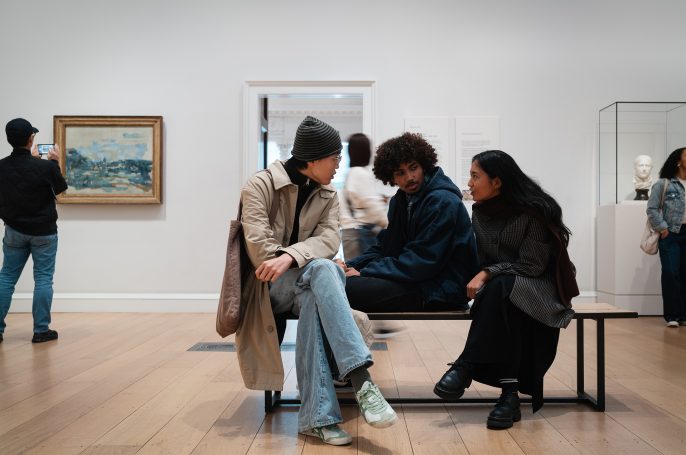
Moving to University
Hi, I’m Hollie! As someone who has done the move, across the country from one city to another, for university, I’m hoping I might be able to provide some insight on what helped me prepare for the move, as well as reflect on some of the things I wish I had known before. I will also detail some of the things my parents did to make the process easier for me along the way.
The Physical Move
So, whether you are moving from Surrey or Scotland, there is of course the weight of the physical move, from home to halls, which for many students can be quite stressful. You’ll probably start out trying to form a very concise list of all the ‘necessities’ you’ll need to survive alone, and then as it gets nearer to the moving date you’ll notice the list will inevitably expand. You may be the best planner in the world, but one tip I can give you throughout this process is to stay calm! As the moving date looms, you will likely have lots of things running through your mind, will you miss home? Will you make friends immediately? Will you like your course? Keeping calm is key, but don’t be annoyed if you have trouble holding back the tears.
Logistically, it’s helpful to prepare for the expansion of the luggage allowance. Many students find themselves to be a little nostalgic on moving day and will likely grab some things they didn’t think they needed on their way out – sentimental objects are rarely in the original packing plan.
If your parents are planning to drive you and your belongings on move in day, have a plan for parking! In London, many of you may know that parking is hard to come by, and if you decide to come to the Courtauld, and stay in Duchy House your first year, parking is exceptionally difficult to find, but not impossible, I suggest downloading the Just Park App and getting your parents to have a browse before you come to see where parking spaces may be nearby, give yourself about 3 options as its possible they’ll be full when you get there. (My dad knows this all too well, having received many parking ticket or even accidental bus lane fine from the times he’s moved me into halls or my second and third year flats over the last three years.)
Lastly for the physical matter of moving, I would recommend, if you have the space, to bring some of the staple cupboard groceries with you, things like olive oil, salt and pepper, spices you love, condiments, tea bags etc. My dad secretly packed me a box of some of my favourite things like this when I first came down and it was quite unforgettable. You don’t realise how much you take advantage of the things that you always have in your kitchen cupboards at home until you suddenly don’t have them, and often you’ll find you forget to include them in your weekly shops. Sometimes it’s the small things that can help you settle in quicker.

Just Park App
The items that everyone forgets to pack…
Whatever you decide to bring or don’t bring, and whichever ‘student essential’s’ list you print out from the internet, here’s a few items that have saved me along the way that you might not have thought about bringing.
The top of my list is a screwdriver, thankfully my dad once again saved the day and equipped me with two small screwdrivers, which have really managed to help me build, or fix, anything I’ve had to over the years.
The second one is sellotape, another thing everyone takes for granted at home and suddenly feels lost without. Endless fixes can be achieved with some tape.
The third one is a mini sewing kit. I can still remember the three people in Duchy House who had a mini sewing kit in first year. And honestly, sometimes having the more obscure items that everyone forgets can be a great way to make friends
The remaining items on my list are perhaps more practical, a small first aid kit, with the usual plasters, lemsip, paracetamol and alcohol wipes in. These are even better if made personal by a friend or parent, and you find things like your favourite chocolate bar, a family recipe or photographs of your pets in.
And lastly an extension cord, for all of the electrical goods you bring along.
How to prepare for the transition:
I’d now like to discuss some of the things I did to prepare for the transition, that is from living at home, to independence, from a city I know, to one that I did not, and the responsibility of budgeting my money.
- Learn to cook!
Many students come to university having never cooked a hot meal for themselves, it is vital to come with some basic cooking skills, especially when living in non-catered accommodation. Simple recipes like pasta, soup, oven pies are helpful.
Another thing I did in preparation was try to find some recipes that I might like to make for myself, it helped me get excited about cooking for myself and getting to choose what I eat every night. It was also helpful to find recipes that replicate the kinds of things I would usually go out for to eat or order in, as this can help curb some costs along the way. So for example I love Wagamama and found that they had several of their recipes on their website.
Another great resource is Mob Kitchen, they publish ‘fakeaway’ recipes as well as speedy ones, vegan ones, comfort food on their website and social medias, which are generally easy to follow and don’t have too many ingredients.

Mob Kitchen: A great resource for recipes.
- Get an Art Fund Pass
At the beginning of the term you will have the opportunity to apply for a student art fund pass using your email, I urge everyone to do this. The pass gives you discounted or free entry into galleries, museums and national trust homes and only costs £5 for a full year. An essential money saving tool for an Art History degree.
- Research and Understand your journey times
Another thing to consider, depending on where you decide to live whilst at university is to understand how and how long it might take you to get to university. It’s important to consider that whilst google maps might say it takes 20 minutes by bus, if you have a 9am lecture it may actually take double that time, rush hour traffic is real! Especially in London.
Also its worth noting that not all maps will account for the time it takes you to get through the tube station and onto the platform and walk between platforms if you change tube. Citymapper however does, so I recommend downloading that for public transport route information.
Working out the cost of tour daily journeys beforehand is helpful in trying to build a weekly budget.
Which leads me to the next section, perhaps one of the most important in this presentation…
Talk about money!
It somewhat goes without saying, but it is vital to have a frank conversation about money with your parents. This kind of conversation can often be awkward and comes in different shapes and forms, but here are a few things I urge you to consider and discuss together in preparation for moving to university.
- Student loan logistics
If you have decided to opt in for a student loan, I’m talking about the maintenance loan here, which is the one that supplements living and accommodation costs, it’s important to know when you will be receiving that. Your loan comes in at the start of each term, once you have enrolled first year, this means you have physically had the enrolment appointment at The Courtauld and they have confirmed you are taking up your offer, then student finance will release the first instalment. This can sometimes take a few working days. Most student accommodation will account for this delay, so there’s no need to worry about not receiving the loan before actually moving into halls, if this is the means you have of paying for rent. However, students should remember to account for this when you return after Christmas and Easter as often you won’t have received the loan until a few days into term.
- What to do if you make a mistake?
There are lots of student bank account options and you may not be sure whether you even need one. Whilst it is not necessary for everyone, it is often helpful to have the overdraft options that student bank accounts provide, as most accumulate 0% interest whilst you have student status. Of course, I am just a student myself and not fully equipped to advise on this, but from my personal perspective, I know it has helped me and a few of my friends when we’ve had a bad budgeting week.
The idea of having something to fall back on, especially in the first few weeks of moving when mistakes are inevitable, is very helpful. Whether it’s a small fund you and your parents save and put aside for these times or an overdraft option, make sure to discuss this beforehand. Knowing what to do if you make a mistake with your money is helpful in providing ease in those first few weeks of independence and can reduce stress.
- You may budget, but be willing to reconsider.
London is expensive. It is advisable to have an initial budget plan when you first come, think transport, food shopping, social activities, toiletries, etc. However, as much as you can research this in theory, reality often materialises slightly differently. Discuss whether your parents have the means to help with money, or if you might have to get a part time job to supplement these costs.
Part-Time Jobs
Luckily, I’ve tried and tested several part-time jobs during my three years at university and can recommend some great places to look at.
Lots of students like to have flexibility with their part time jobs, this is particularly helpful when you have essays due or uni work accumulates. That’s why a lot of people I know, including myself have done catering jobs. There are lots of catering agencies in London who seek student workers, many of which are zero hour contracts and have apps, which means you decide how many hours you do that week. The work is mostly holding canapés at events across the city and there are often lots of places and times to choose from.
Another job that I have had and many of my peers at The Courtauld have taken part in is as after school nannies. I use a company who hire students and match them up with a family based on needs and location. This is good because the working time is often outside of uni hours and fits in well with a typical week, and the pay is good!
Also, each year there are a number of opportunities to be paid to work at Courtauld events, as a Student Ambassador, you have to apply for these roles in the first few weeks of term in October, and can be called upon throughout the year for open days, offer holder events, evening courses etc. and again, it is flexible, you can say no if you aren’t available.
What I wish I had figured out earlier:
Finally, as a third year student, there are some helpful things I have learnt along the way…
- Travel Passes
It took me far too long to assess how much I was actually spending on public transport a month, and do something about it! I highly recommend getting an 18+ Student Oystercard, yes it provides bus journeys for £1 instead of £1.50 and discounts some tube journeys but most importantly, purchase a travelcard! This is where the savings really come in, you can get weekly or monthly travelcards where you pay a one off amount for unlimited travel in your selected zones across transport options. I used to pay around £230 a month when I used my contactless card for transport and now spend around £90 on a monthly travelcard. It’s the one thing I really regret not looking into sooner!
- Railcards
Also, the 16-25 railcard is great for discounted travel, I use mine constantly to get cheap tickets home to Manchester for holidays and the odd weekend. Sign up for all the Trainline emails too and download Trainpal another great app for train travel discounts.
- Reflect on note taking skills EARLY
Now I haven’t spoken too much about how to prepare academically for the move to university, because I think much of that growth comes in the first year, which at The Courtauld, the results of which are not counted towards your final degree, and so there is lots of room to figure out these things then. However, one thing I wish I had done before coming to university was experience a lecture / figure out how I take notes the best. Coming from small classes where discussion is embedded, to lectures which are more presentation format, there can be a transition in how you are taking in information. It’s great to reflect early on whether the notes you are taking are helpful. For me, it took me a few months to realise that recording the lectures on a small recording device was helpful, it meant I didn’t have to focus on getting everything down on paper in the moment, instead I could focus on listening and seeing what the lecture offered, making notes afterwards and using the recording to replay any parts I may have missed or struggled to understand the first time around.
- Don’t stress about second year accommodation in January
You may have friends who have gone to university in places outside of London, and around January time or possibly earlier, many of them will have decided who they are living with next year and found a flat and maybe even signed a contract. Don’t panic, January is way to early to be doing these things if you’re a student living in London, it is simply not possible!
Instead, if you are going to live in student halls second year you’ll want to start looking in February and applying around March, however if like many students do, you want to find a flat with friends then you won’t start looking until a month or so before you are set to live there. The reality is that flats in London go fast!
There are definitely benefits to this, students get to finish a year at uni before deciding they definitely will be sticking around for another one and you also get a lot longer to decide who you are going to live with in second year and what area you’d like to live in.
Helpful links and apps:
https://www.justpark.com/ app for finding parking in London
http://www.mobkitchen.co.uk/ : great for easy and tasty recipes
https://citymapper.com/london?lang=en : accurate commuting information, takes into account the time it takes you to walk between tube changes, accounts for bus route changes
https://www.openrent.co.uk/ great place to look for second and third year flats.





